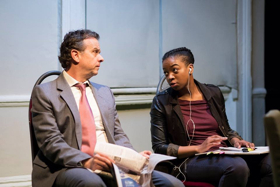Review: WHITE GUY ON THE BUS, Finborough Theatre

![]() There's the Philly Sound, the Rocky Steps and Elton's song, but there's much more to Philadelphia than those cultural icons, something that doesn't so much emerge as explode in Bruce Graham's spiky, uncomfortable, bold play, White Guy On The Bus.
There's the Philly Sound, the Rocky Steps and Elton's song, but there's much more to Philadelphia than those cultural icons, something that doesn't so much emerge as explode in Bruce Graham's spiky, uncomfortable, bold play, White Guy On The Bus.
Ray has wealth and status - he's the proof of The Great American Dream, pulling himself up by the bootlaces to be the "Numbers Guy" in a financial services company. And he's white, natch.
He lives in the comfortable suburbs with his schoolteacher wife, Roz, a firebrand who relishes conversational confrontation and lives for her job in a poor (ie black) district across town. She's committed to her kids but under no illusions about both how closed off their life chances are and how complicit so many kids become in such poverty of expectations. "They aren't all bad kids - but plenty of them are" probably sums up her cold-eyed take on her charges - she gives them so much, but she chips away at them like a Daily Mail editorial once off duty.
She's challenged by their adopted son, Christopher's, fiancee, Molly, a Bryn Mawr white liberal who can talk the talk of diversity and refute inner city white flight, but can she walk the walk, when push comes to shove?
We watch as decent wine is drunk while Roz and Molly bicker on manicured lawns at Ray's house, but we also get to see Ray riding the bus with Shatique, the bus that is filled with black women and that terminates at the penitentiary. Shatique cuts coupons from the magazines (with plastic scissors) and lodges her son at her mother's so he can go to a school that may not be as privileged as the one Molly attended, but isn't as bad as the one in which Roz teaches.
Student nurse, Shatique, has something Ray wants - she knows that and so do we - but it's only at the end of the first act that we find out what and, though obvious in hindsight, it slashes across the narrative like the crack of a whip. The destination of the bus is still the same, but the play could go anywhere.
The script makes considerable demands on the five actors, as the characters are given positions rather than personalities, making convincing relationships tricky to build. Ray and Roz love each other and, in middle age, spoon like teens, but can they really hold those all-consuming jobs and those sharply defined views and get along so famously? Can Molly really change so swiftly? It's as if we never really understood her - twice. Donald Sage Mackay, Samantha Coughlan and Marina Bye (and Carl Stone as the under-written Christopher) strive for three dimensions in their performances, but the script anchors them in two.
The most rounded individual is Shatique, a pitch-perfect performance by Joanna McGibbon, trapped once by her circumstances and then again by the dilemma with which she is presented by Ray. This bright black woman has made an accommodation with the divided city of Philadelphia - an uneasy peace, but a peace for sure - until Ray cruelly tips that up for both his own ends and, explicitly, to allow Shatique and her son to be "more white." as a quid pro quo. It'll make her life better - won't it?
With murders in London climbing to unprecedented levels and the USA cleaving along racial lines more than at any time since the Civil Rights marches, this play asks important questions and provides some discomfiting answers. For all its dramatic shortcomings, it's thought-provoking, surprisingly unpreachy and will live in the mind long after other plays have faded.
So too, of course, will the issues it addresses with such forthright ferocity.
White Guy on the Bus continues at the Finborough Theatre until 21 April.
Reader Reviews

Videos
